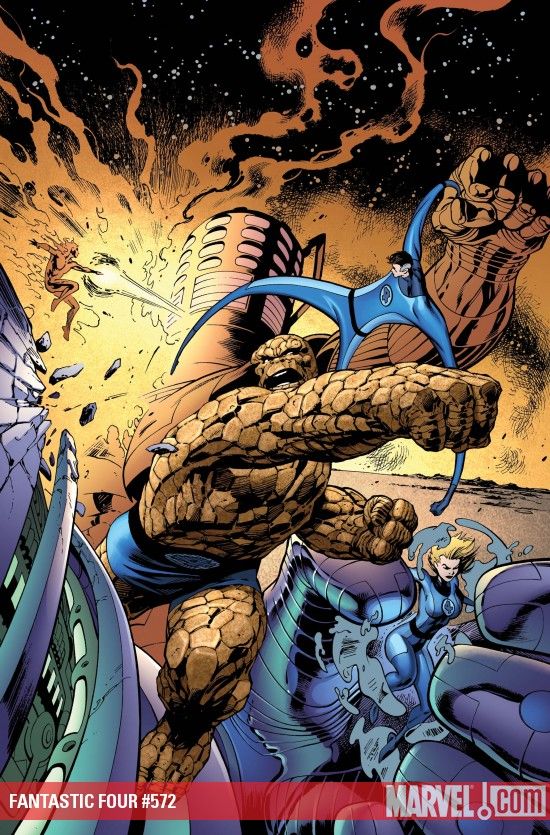I described Jonathan Hickman's first "Fantastic Four" issue as a "promising start," and in between that issue and this one (only the third issue into his run), Hickman has moved past "promising" and into "stellar." Under Hickman, this series has catapulted into the top tier of Marvel comics.
Hickman's done that by jumping straight into the impossibly cosmic side of storytelling, then reigning it back to the human level. I enjoyed the Millar/Hitch run, until it faltered at the end, but even in their best issues, there was a discordant feeling between some of the seedier aspects of the story and the generally wholesome tradition of the Fantastic Four. Hickman has the same level of awesome spectacle (perhaps even more awesome and more spectacular, taking Millar's parallel world and divergent timeline nuggets and turning them into a full-blown Marvel multiverse), but he also creates a stronger, more consistent tone to the series.
Unlike some of the Millar issues, this Hickman run doesn't feel like it's trying to be cool. It's amping up the drama, making the conflict ridiculously insurmountable, but it's not trying to change the FF into something its not. Even the return-to-basics cover design (with classic Alan Davis illustration and a retro-logo) signify that Hickman doesn't have to mess with a proven formula to tell good stories.
Yet this isn't just another case of a writer deficient in ideas mining the past. It's not just a nostalgia comic, recalling the glory days of Lee and Kirby or Byrne and Byrne. Hickman has established a strong voice in his comics, and though he adjusts that voice to match whatever mainstream project he's working on, it's clear that his stories have strong thematic underpinnings, and his characters have a bit more depth than you might expect.
In issue #572, Hickman, ably assisted by the pencils of Dale Eaglesham, wraps up his opening story about the "The Council," a collection of multiversal Reed Richards who defend parallel universes from the greatest threats imaginable. In the text piece in the back of the issue, Hickman points out the irony in writing a story focusing on Reed Richards (many Reed Richardses) as a way to shift the focus of the series away from its recent Reed Richards-centrism. But that's exactly what he does. He gives us three issues of a ridiculously cosmic Reed Richards story to remind us (and remind his characters) that Mr. Fantastic is just one member of this family of heroes. Reed learns his lesson, but it takes a long look in the funhouse mirror of parallel Earths for him to see the truth.
Sure, this opening arc might be a bit of Charles Dickens's "A Christmas Carol" mixed with Alan Moore's "Tom Strong." But it's that infused with a little bit of Kirby and a whole lot of Hickman. It's very good, and if the covers begin sporting "The World's Greatest Comic Magazine" blurb on the top, I certainly wouldn't bother to object.

